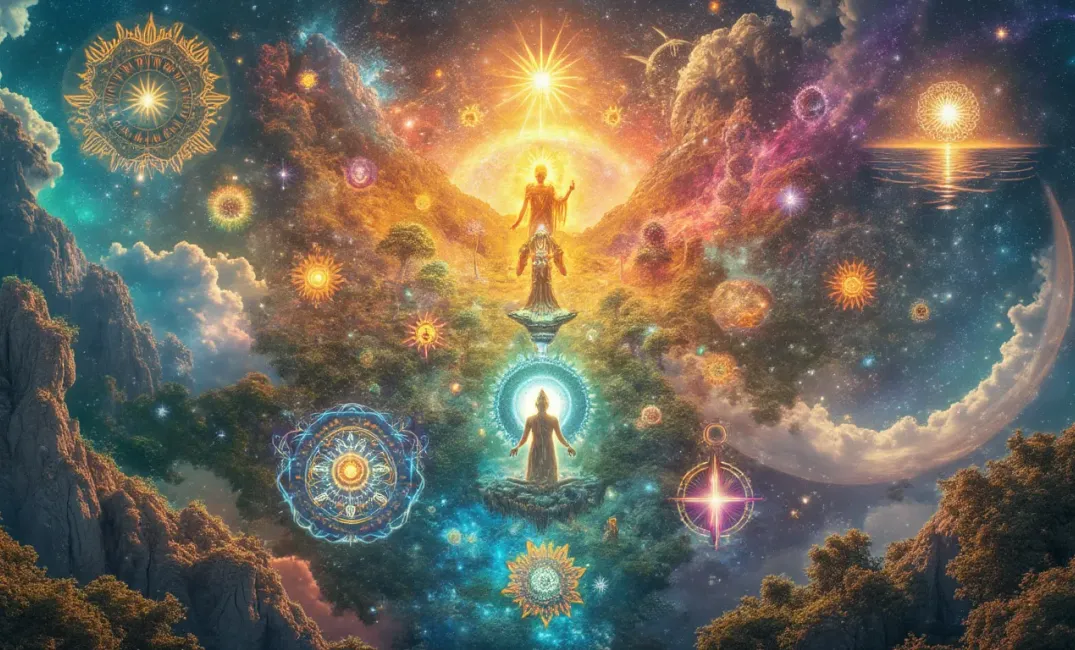Embracing the Divine: Humanity’s Spiritual Quest
Amidst the vastness of the universe and the expanses of time, humanity has eternally sought to understand its place and purpose through spirituality and belief systems. These spiritual dimensions of existence have provided solace, community, and ethical frameworks, shaping cultures and civilizations throughout history. Exploration of the divine and spiritual connections manifests in myriad forms—from polytheistic pantheons to monotheistic revelations, from animistic spirits to philosophical contemplations. This entry probes the profound evolution of human spirituality as it reflects our enduring quest for meaning and transcendence.
"That which is sacred resides not in heaven but within the heart of each being." — Anonymous Sage
Seeds of Belief: Ancient Roots and Evolution
The Dawn of Spiritual Awareness
- Animism and Nature Worship: Among humanity's earliest spiritual constructs was animism—the belief that a spiritual essence animates the natural world. Early humans imbued rivers, trees, rocks, and animals with souls, respecting their sanctity and power. This relationship nurtured harmony with nature, reflecting a deep appreciation for interconnectedness.
- Polytheistic Traditions: As societies matured, spirituality expanded into polytheistic systems, where diverse deities presided over natural forces, human emotions, and societal actions. The Mesopotamian, Egyptian, Greek, and Norse pantheons exemplify richly textured mythologies, expressed through vibrant narratives and elaborate rituals.
The Rise of Monotheism and Philosophical Inquiry
- Monotheistic Pathways: The belief in a singular, all-powerful deity marked a transformative shift. Grounded in revelation and prophecy, major monotheistic faiths like Judaism, Christianity, and Islam fostered profound theological frameworks, exuding a moral and ethical gravitation towards notions of divine justice, mercy, and presence.
- Philosophical Reflections: Parallel to religious evolution, philosophical systems emerged, emphasizing reason and ethics. In Eastern traditions, Confucianism and Daoism offered spiritual reflections on harmony, governance, and the cosmos, while Indian philosophies like Jainism and Buddhism explored inner enlightenment and liberation from suffering. In the West, the Socratic method introduced critical examination of life's purpose.
Spirituality's Societal Impact: Cultures, Communities, and Change
Cementing Cultural Foundations
- Rituals and Rites: Spiritual rituals remain integral to cultural fabric, marking life's significant milestones—birth, coming of age, marriage, and death. Through structured ceremonies, spiritual communities pass down values, interlinking individual journeys with collective cultural memory.
- Architecture and Art: Spiritual inspiration spurred architectural marvels and artistic endeavors, visible in cathedrals, temples, mosques, and icons. From Angkor Wat to Notre-Dame to the Great Mosque of Cordoba, sacred spaces are both places of worship and embodiments of profound symbolism and cultural patronage.
Guiding Ethical and Social Norms
- Moral Teachings: From Hammurabi's code to religious scriptures, spirituality foundationally influences ethical norms and legal systems. Narratives of sin, redemption, and ethical righteousness distance humanity from chaos and inspire codes of justice, compassion, and altruism.
- Social Cohesion and Conflict: Spirituality and belief systems have acted as unifying forces, helping communities forge shared identities and aspire towards shared goals. However, they have also fueled divisions and conflicts, influencing intercultural dynamics and power struggles. The Crusades, Reformation, and numerous religious tensions underscore complex interrelations between belief and politics.
Modern Spirituality: Reflective Transformations
New Movements and Hybrid Beliefs
- Eclectic and New Age Spirituality: Contemporary society witnesses the emergence of eclectic spiritual movements that blend traditions, philosophical themes, and personal exploration. New Age spirituality often incorporates meditative, healing, and wellness practices, fostering individualistic and inclusive belief systems.
- Globalization and Syncretism: The digital era enables unprecedented exchanges of spiritual knowledge and practice. Syncretic movements thrive as technology facilitates cross-cultural encounters, resulting in hybrid practices that incorporate elements from Buddhism, indigenous wisdom, Western mysticism, and more.
Science, Technology, and Secularism
- Rational Inquiry and Spiritual Coexistence: The advancement of science and secular thought challenges traditional beliefs, prompting dynamic engagement between spirituality and rationalism. As cosmological understanding broadens, new theological interpretations arise to reconcile sacred narratives with scientific discoveries.
- Immaterial Digital Spirituality: The rise of virtual environments presents novel avenues for spiritual expression. Online communities gather for digital congregations and meditative experiences, expanding spiritual landscapes into the digital realm, and offering paths to transcend geographic constraints.
The Spiritual Horizon: Futures of Faith and Belief
Transcending Earthly Boundaries
- Interstellar Spirituality: As humanity ventures beyond Earth, spirituality will likely explore cosmic dimensions. Space settlements propound questions on faith adaptation within extraterrestrial environments and the preservation of spiritual heritages among distant stars.
- Universal Interfaith Dialogues: The global village facilitates engagement between diverse spiritual traditions, encouraging interfaith dialogues that seek shared values, fostering coexistence, equity, and mutual understanding for a pluralistic world.
Ethical and Spiritual Stewardship
- Sustainability and Spiritual Responsibility: The ecological imperatives facing humanity intertwine with spiritual ethics. Spiritual doctrines take an active role in advocating stewardship, emphasizing humanity's duty to nurture and protect the environment for future generations.
- Uniting Humanity Through Spiritual Equality: Evolving spiritual discourse has the potential to dismantle hierarchical exclusivities, promoting spiritual equality. Embracing this vision affirms the unity and interconnectedness at the heart of humanity's diverse spiritual legacy.
Conclusion: The Endless Journey of the Spirit
The evolution of human spirituality is a profound tapestry woven from countless narratives, beliefs, and practices that have shaped human existence. It bears witness to our enduring quest to understand the cosmos, the sacred, and ourselves. As civilizations rise and transform, spirituality remains a vital wellspring of inspiration, resilience, and ethical grounding.
In a rapidly changing world, spirituality offers continuity and coherence, bridging the past with potential futures. By cherishing spiritual diversity and pursuing shared values, we may discover profound harmony in our common human journey.
"The soul's greatest journeys converge, not in the certainty of answers, but in the warmth of shared quests." — Anonymous Philosopher
Embarking upon this eternal journey, may humanity find in spirituality both a compass and a sanctuary, guiding us toward a universally cognizant and compassionate destiny.
POLYTHEISM, FAITH, SOCIETAL IMPACT, MONOTHEISM, UNIVERSAL DIALOGUE, BELIEF SYSTEMS, SPIRITUALITY, CULTURAL EVOLUTION, MODERN SPIRITUALITY, ETHICAL STEWARDSHIP

